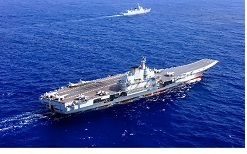
Security threats in Indo-Pacific after China maritime assertiveness
Historically, disagreement and conflict over territorial possession, on land and in water, have generally marred multilateral and bilateral relations in most of South and South East Asia. Exercising military might employed to effectuate unlawful forays into neighbouring territories, has triggered disputes.
The South China Sea, teeming with islands and archipelagos, has long been the genesis of differences over international maritime boundaries in the region. The long coastlines of countries in the Indian and Pacific Ocean necessitate a clear demarcation of the maritime boundaries of nations for exploration and use of marine resources, energy production, and, military presence.

Indonesia’s Natuna Islands is a global trade route rich in fishing stocks and energy reserves. It posed a potential flashpoint between China and the 10-member ASEAN bloc owing to China’s relentless incursions into the Indonesian EEZ in waters around the Natunas. In September-October 2021 China conducted an extended seabed mapping exercise in North Natuna’s Tuna Block. Its offshore survey vessel Haiyang Dizhi 10 was escorted by Coast Guard vessels.
Similar patrolling operations have been conducted by Chinese Coast Guard vessels near Sarawak at Malaysian gas drilling oil rigs. Likewise, an unannounced gathering of Chinese fishing vessels at Whitsun Reef in the Spratly Islands in early 2021 ignited a diplomatic row with the Philippines.
In the wake of maritime security challenges confronting ASEAN members, Vietnam has proposed the establishment of an ASEAN Coast Guard Forum (ACGF) as a platform for cooperation and coordination among the Coast Guards and maritime law enforcement agencies of the ten member nations. The proposal was thoroughly discussed at a meeting hosted by the Philippine Coast Guard (PCG). The ASEAN Coast Guards are members of the Heads of Asian Coast Guard Agencies Meeting (HACGAM), a grouping of 22 member states where these law enforcement agencies are provided an opportunity for networking and information sharing.
At the heart of the United States’ Indo-Pacific Strategy for maritime security in the region is the Coast Guard. In 2021, the Indonesian Sea and Coast Guard and United States Coast Guard jointly created a maritime training centre in Batam, which aims to increase the capacity and capability of the Indonesian Maritime Security Agency (BAKAMLA).
Experts observe that China has “successfully exploited” ASEAN’s weaknesses in “decision-making by consensus” and leveraged it to comply with its designs in the South China Sea. Negotiations with China on the Code of Conduct in the South China Sea (COC) have now entered its third decade. With little departure from precedent, ASEAN has come to acknowledge the inability to accomplish progress with China over the outline for and implementation of the COC.
The block remains somewhat divided on the degree of cordiality each member country exercises in its relations with China.
Mainland South East Asian countries viz., Laos, Cambodia, Thailand, Myanmar, for instance, receive financial, military and technical support from China to combat piracy in the Malacca Strait. Thailand and Laos conduct coordinated patrols in the Mekong River to counter maritime crime.
Much along the same vein, Philippines, Malaysia, Indonesia, Brunei, Singapore and peninsular Vietnam have been party to initiatives with China with relatively successful outcomes, barring concerns over sovereignty. The cooperation with China in combating sea robberies in the Sulu-Celebes Sea is a case at hand.
Other, equally plausible, deterrents discouraging an explicit disposition challenging Chinese presence in the SCS may be rooted in the ASEAN’s conscious orientation to carefully weigh its actions in the region in order to de-escalate tensions and prevent an indeterminate spiralling of the fragile intra-regional relations.
As de facto leader of ASEAN, Indonesia announced the convening of the first-ever ASEAN Coast Guard Forum in February 2022 in Batam with the aim to counter threats posed by Chinese aggression and to formulate a common perception and strategy to deal with it. The meeting, however, fell through.
In the backdrop of a more significant role envisaged for the US in enforcing maritime security in South East Asia, it will become even more vital for members of the ASEAN to strategise and device a mechanism to overcome security challenges while ensuring lasting peace in the region, which, they are unlikely to achieve without Chinese cooperation and participation. (POREG)
-
CHINA DIGEST
-
 ChinaChina Digest
China’s PMI falls for 3rd month highlighting challenges world’s second biggest economy faces
ChinaChina Digest
China’s PMI falls for 3rd month highlighting challenges world’s second biggest economy faces
-
 ChinaChina Digest
Xi urges Chinese envoys to create ‘diplomatic iron army’
ChinaChina Digest
Xi urges Chinese envoys to create ‘diplomatic iron army’
-
 ChinaChina Digest
What China’s new defense minister tells us about Xi’s military purge
ChinaChina Digest
What China’s new defense minister tells us about Xi’s military purge
-
 ChinaChina Digest
China removes nine PLA generals from top legislature in sign of wider purge
ChinaChina Digest
China removes nine PLA generals from top legislature in sign of wider purge
-
-
SOUTH ASIAN DIGEST
-
 South Asian Digest
Kataragama Kapuwa’s arrest sparks debate of divine offerings in Sri Lanka
South Asian Digest
Kataragama Kapuwa’s arrest sparks debate of divine offerings in Sri Lanka
-
 South Asian Digest
Nepal: Prime Minister Dahal reassures chief ministers on police adjustment, civil service law
South Asian Digest
Nepal: Prime Minister Dahal reassures chief ministers on police adjustment, civil service law
-
 South Asian Digest
Akhund’s visit to Islamabad may ease tensions on TTP issue
South Asian Digest
Akhund’s visit to Islamabad may ease tensions on TTP issue
-
 South Asian Digest
Pakistan: PTI top tier jolted by rejections ahead of polls
South Asian Digest
Pakistan: PTI top tier jolted by rejections ahead of polls
-






Comments